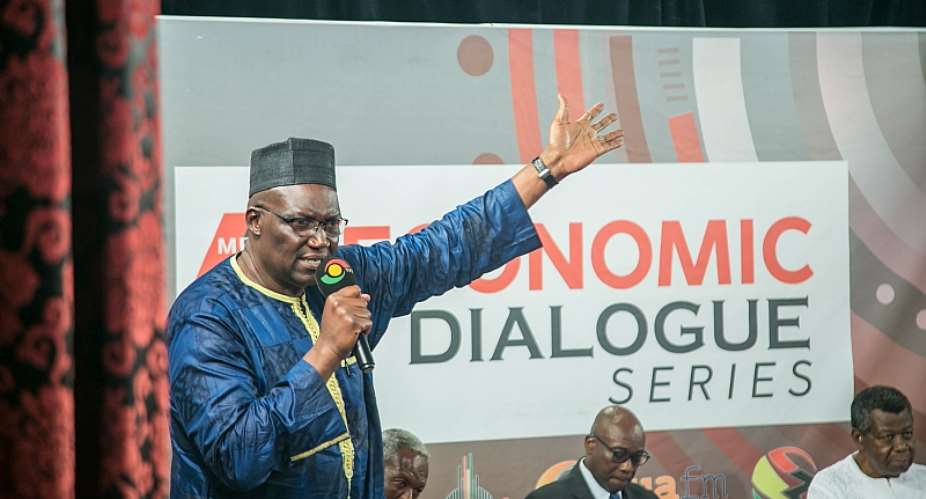The Chief Executive Officer (CEO) of Dalex Finance, Mr. Ken Thompson has indicated that continually supporting the Cedi has a way of damaging the Agricultural Sector.
The financial expert’s comments come at a time where Ghana’s Cedi continue to struggle as compared to the major trading currencies. In a bid to improve the situation, the government has been adopting drastic measures to support and stabilize the Cedi to ensure it performs better.
Speaking at the Media General Economic Dialogue Series held in Accra recently on the theme “The Ghana cedi, breaking the cycle of depreciation” however, Mr. Thompson insists that aiding the cedi goes a long way to damage the Agric Sector.
He believes the woe of the cedi is purely a structural problem that will require a long-term effort and a painful process to address.
“…instituting kneejerk measures to arrest the downward slide of the currency will fail…”. How can we expect to correct a structural problem without pain? He questioned.
According to the CEO of Dalex Finance, we are exporting Ghana’s wealth and jobs overseas by continuing to support imports of goods and services.
“…’supporting’ the cedi prevents the right investment decisions from being made, prevents us from changing our consumption habits and puts our food security at risk by reducing the price of imported food and making our local food production expensive and uncompetitive”.
“This damages our agricultural sector and puts the nation’s food security at risk. Let the cedi fall to reflect its true value. This will promote local food crop farming and exports”.
“Unemployment and poverty will continue to rise unless we start reducing the level of food imports and increasing local food production. If we continue to import food, one day we will lose our ability to produce food altogether and if our trading partners get upset with us, we will starve…” says Ken Thompson, Chief Executive Officer of Dalex Finance.
“…we are importing everything and producing virtually nothing. This is the same country that took cocoa, which is not indigenous to Ghana, developed it, and at a point, became the number one exporter in the world, so don’t tell me Ghanaians do not respond to economic incentives….” he said.
Touching on some of the pragmatic measures that can help address the phenomenon in the long-term, he said “…agriculture is the silver bullet. Make agriculture ‘sexy’, provide the rural areas with Wi-Fi, roads, health facilities, potable water, good schools, extension services and all the things that will make life comfortable for those who choose to live there, otherwise we will end up nowhere…”.
He also emphasized the need for the provision of tax and other incentives to exporters. “…let us provide market development, capacity building and access to finance to exporters. Just focusing on replacing the food and livestock that we import such as rice and chicken will make a huge difference to Ghana’s foreign exchange reserves and food security…”, he stated.
He seized the opportunity to clear the myth that blames the fall of the cedi on Forex Bureau operators. He said “…these operators do not have the resources to undertake the kind of speculation we mistakenly credit them with. He said the operators should rather be appreciated for making the value of the cedi even lower. They perform a very effective arbitrage function…”.
Other speakers at the event were Dr. Tony Oteng-Gyasi, former AGI President; Messrs Emmanuel Asiedu-Mantey, a former Deputy Governor of the Bank of Ghana (BOG) and Kwame Pianim, an Economist.





 Former Kotoko Player George Asare elected SRC President at PUG Law Faculty
Former Kotoko Player George Asare elected SRC President at PUG Law Faculty
 2024 elections: Consider ‘dumsor’ when casting your votes; NPP deserves less — P...
2024 elections: Consider ‘dumsor’ when casting your votes; NPP deserves less — P...
 You have no grounds to call Mahama incompetent; you’ve failed — Prof. Marfo blas...
You have no grounds to call Mahama incompetent; you’ve failed — Prof. Marfo blas...
 2024 elections: NPP creates better policies for people like us; we’ll vote for B...
2024 elections: NPP creates better policies for people like us; we’ll vote for B...
 Don’t exchange your life for wealth; a sparkle of fire can be your end — Gender ...
Don’t exchange your life for wealth; a sparkle of fire can be your end — Gender ...
 Ghana’s newly installed Poland train reportedly involved in accident while on a ...
Ghana’s newly installed Poland train reportedly involved in accident while on a ...
 Chieftaincy disputes: Government imposes 4pm to 7am curfew on Sampa township
Chieftaincy disputes: Government imposes 4pm to 7am curfew on Sampa township
 Franklin Cudjoe fumes at unaccountable wasteful executive living large at the ex...
Franklin Cudjoe fumes at unaccountable wasteful executive living large at the ex...
 I'll 'stoop too low' for votes; I'm never moved by your propaganda — Oquaye Jnr ...
I'll 'stoop too low' for votes; I'm never moved by your propaganda — Oquaye Jnr ...
 Kumasi Thermal Plant commissioning: I pray God opens the eyes of leaders who don...
Kumasi Thermal Plant commissioning: I pray God opens the eyes of leaders who don...
